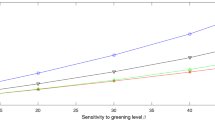Abstract
Nowadays, most people are concerned about environmental pollution. So, utilizing eco-friendly products is on the rise in society. There is a trend going on among the companies to make green products. However, some companies produce non-green substitutable products in the environmentally concerned market. Therefore, examining how these two organizations compete in the market is necessary. This paper analyzes the competition between two supply chains, a forward chain and a reverse chain for the very first time. Each chain is constituted of one manufacturer and one retailer. The first manufacturer of the forward chain makes a green product, whereas the second manufacturer of the reverse chain makes a substitutable non-green product. In addition, for non-green products, the second manufacturer offers a warranty period for refurbishing defective items. Two game theory models (centralized and decentralized) are developed and compared for the competition among manufacturers and retailers involved in two supply chains. In the competitive market, how the two manufacturers and retailers set their pricing strategies, greening level, and the warranty period are investigated. Finally, numerical and sensitivity analyses have been performed to examine the effect of various parameters on key decision variables of the supply chain problem.














Similar content being viewed by others
Data Availability
Not applicable.
Code Availability
Not applicable.
References
Chen S, Wang X, Wu Y, Zhou F (2017) Pricing policies of a dual-channel supply chain considering channel environmental sustainability. Sustainability 9(3). https://doi.org/10.3390/su9030382
Wei J, Zhao J, Li Y (2013) Pricing decisions for complementary products with firms’ different market powers. Eur J Oper Res 224(3):507–519. https://doi.org/10.1016/j.ejor.2012.09.01
Maiti T, Giri B (2015) A closed loop supply chain under retail price and product quality dependent demand. J Manuf Syst 37:624–637 reverse Supply Chains
Tang C, Yin R (2009) Joint ordering and pricing strategies for managing substitutable products. Prod Oper Manag 16:138–153. https://doi.org/10.1111/j.1937-5956.2007.tb00171.x
Basiri Z, Heydari J (2017) A mathematical model for green supply chain coordination with substitutable products. J Clean Prod 145:232–249. https://doi.org/10.1016/j.jclepro.2017.01.060
Grimmer M, Bingham T (2013) Company environmental performance and consumer purchase intentions. J Bus Res 66(10):1945–1953
Zhao J, Wei J, Li Y (2014) Pricing decisions for substitutable products in a two-echelon supply chain with firms’ different channel powers. Int J Prod Econ 153(C)243–252. https://doi.org/10.1016/j.ijpe.2014.03.00
Jamali M-B, Rasti-Barzoki M (2018) A game theoretic approach for green and non-green product pricing in chain-to-chain competitive sustainable and regular dual-channel supply chains. J Clean Prod 170:1029–1043. https://doi.org/10.1016/j.jclepro.2017.09.181
Liu Z, Anderson T, Cruz J (2012) Consumer environmental awareness and competition in two-stage supply chains. Eur J Oper Res 218 (3):602–613. Copyright 2012 Elsevier B.V., All rights reserved. https://doi.org/10.1016/j.ejor.2011.11.027
Hafezalkotob A (2015) Competition of two green and regular supply chains under environmental protection and revenue seeking policies of government. Comp Indust Eng 82:103–114. https://doi.org/10.1016/j.cie.2015.01.016
Wu DD (2013) Bargaining in supply chain with price and promotional effort dependent demand. Mathematical and Computer Modelling 58(9):1659–1669, Computational Simulation and Risk Analysis. https://doi.org/10.1016/j.mcm.2010.12.035
Zhu W, He Y (2017) Green product design in supply chains under competition. Eur J Oper Res 258(1):165–180. https://doi.org/10.1016/j.ejor.2016.08.053
Li B, Zhu M, Jiang Y, Li Z (2016) Pricing policies of a competitive dual-channel green supply chain embedding Sustainability Dynamics in Supply Chain Relationship Management and Governance Structures. J Clean Prod 112:2029–2042. https://doi.org/10.1016/j.jclepro.2015.05.017
Sheu J-B (2011) Bargaining framework for competitive green supply chains under governmental financial intervention. Transportation Research Part E: Logistics and Transportation Review 47(5):573–592. https://doi.org/10.1016/j.tre.2010.12.006
Xia Y (2011) Competitive strategies and market segmentation for suppliers with substitutable products. Eur J Oper Res 210(2):194–203
Sinha S, Sarmah S (2010) Coordination and price competition in a duopoly common retailer supply chain. Comput Ind Eng 59(2):280–295. https://doi.org/10.1016/j.cie.2010.04.010
Kurata H, Yao DQ, Liu JJ (2007) Pricing policies under direct vs. indirect channel competition and national vs. store brand competition. Eur J Oper Res 180(1):262–281. https://doi.org/10.1016/j.ejor.2006.04.002
Aydin R, Kwong C, Ji P (2016) Coordination of the closed-loop supply chain for product line design with consideration of remanufactured products towards post fossil carbon societies: regenerative and preventative eco- industrial development. J Clean Prod 114:286–298. https://doi.org/10.1016/j.jclepro.2015.05.116
Xiao T, Shi J(Junmin) (2016) Pricing and supply priority in a dual-channel supply chain. Eur J Oper Res 254(3):813–823. https://doi.org/10.1016/j.ejor.2016.04.01
Seyedhosseini SM, Hosseini-Motlagh S-M, Johari M, Jazinaninejad M (2019) Social price-sensitivity of demand for competitive supply chain coordination. Comput Ind Eng 135:1103–1126. https://doi.org/10.1016/j.cie.2019.05.019
Li X, Li Y (2016) Chain-to-chain competition on product sustainability embedding sustainability dynamics in supply chain relationship management and governance structures. J Clean Prod 112:2058–2065. https://doi.org/10.1016/j.jclepro.2014.09.027
Lu J-C, Tsao Y-C, Charoensiriwath C (2011) Competition under manufacturer service and retail price. Econ Model 28(3):1256–1264
Funding
The first author is financially supported by the Council of Scientific and Industrial Research (CSIR), India, for financial assistance in the form Junior Research Fellowship (file no: 09/1007(0006)/2019-EMR-I).
Author information
Authors and Affiliations
Contributions
DKJ has formulated the model. The model evaluation and writing part was done by AM. RKJ has done the numerical and sensitivity analysis.
Corresponding author
Ethics declarations
Consent to Participate
Not applicable.
Consent for Publication
We undersigned give my consent for the publications of identifiable details which include graphs and details written within the text (material) to be published in this journal and article.
Conflict of Interest
The authors declare no competing interests.
Additional information
Publisher’s Note
Springer Nature remains neutral with regard to jurisdictional claims in published maps and institutional affiliations.
Rights and permissions
Springer Nature or its licensor (e.g. a society or other partner) holds exclusive rights to this article under a publishing agreement with the author(s) or other rightsholder(s); author self-archiving of the accepted manuscript version of this article is solely governed by the terms of such publishing agreement and applicable law.
About this article
Cite this article
Mondal, A., Jana, D.K. & Jana, R.K. Competition of Forward and Reverse Supply Chain for Selling Two Substitutable Products: Novel Game Theory Approach. Oper. Res. Forum 3, 66 (2022). https://doi.org/10.1007/s43069-022-00175-3
Received:
Accepted:
Published:
DOI: https://doi.org/10.1007/s43069-022-00175-3




